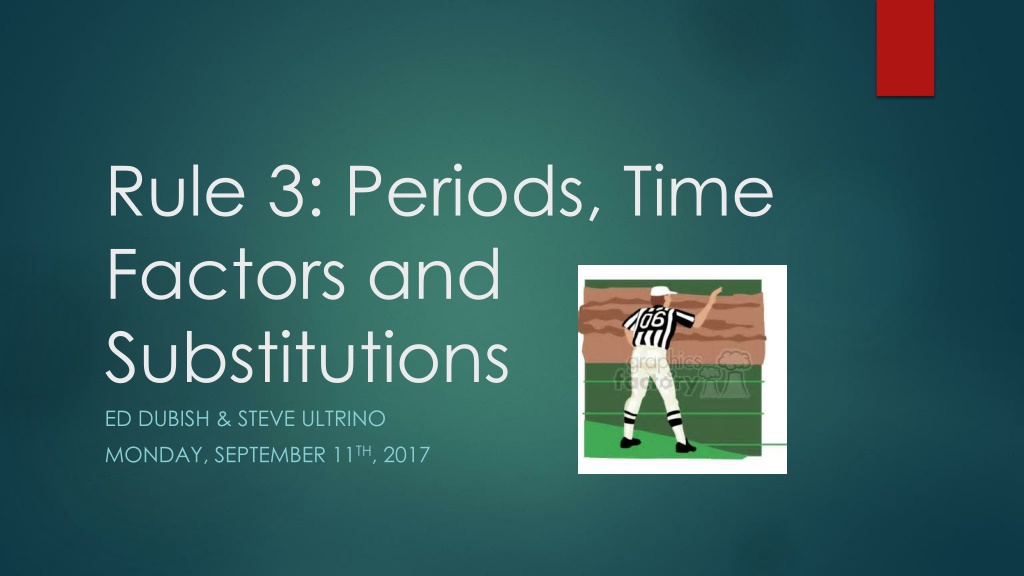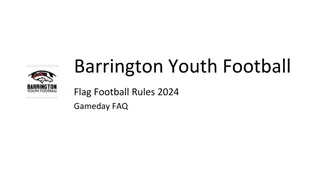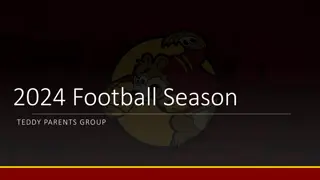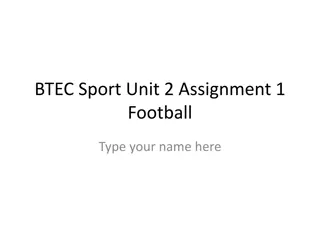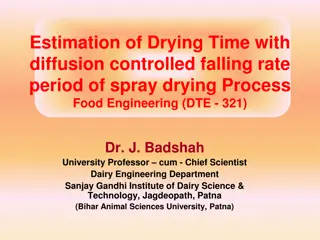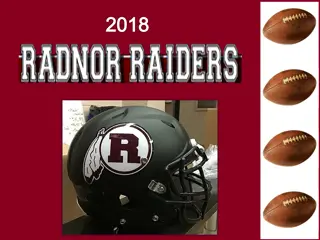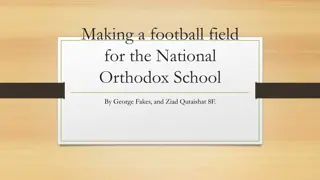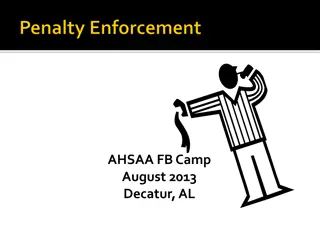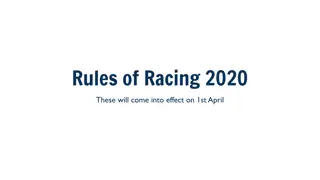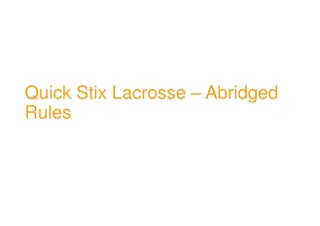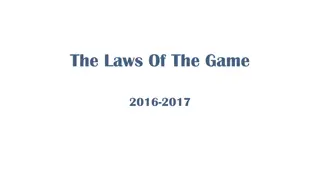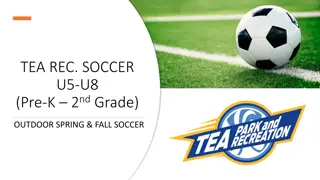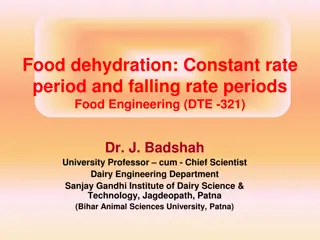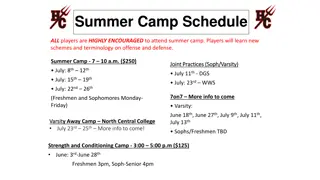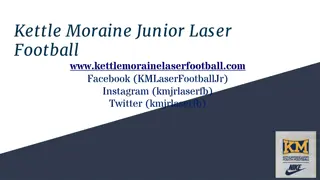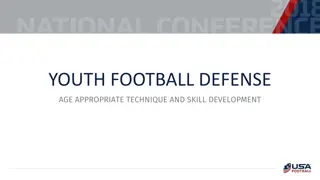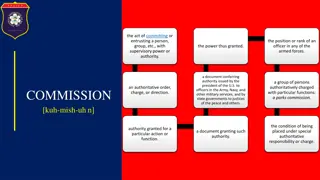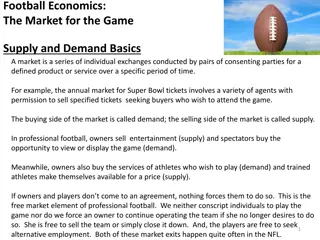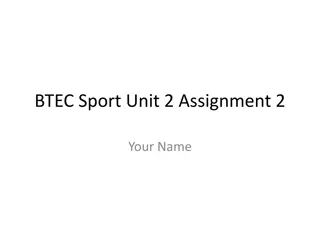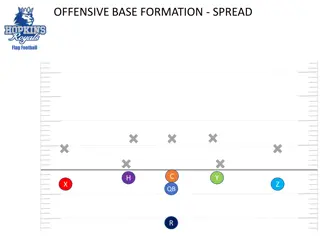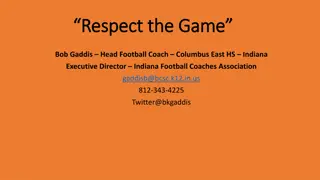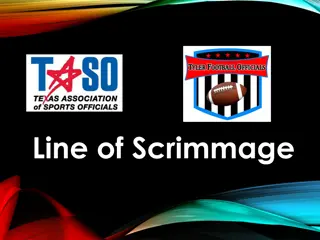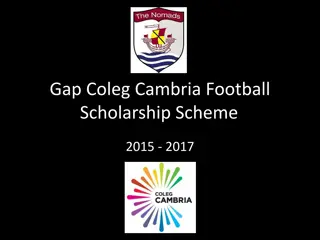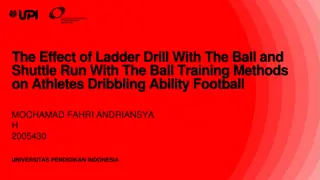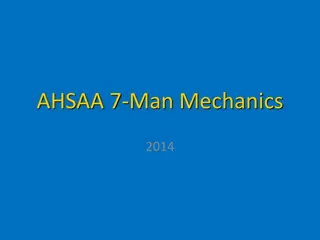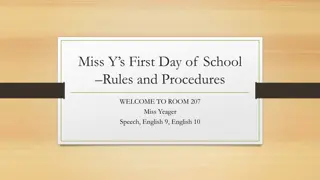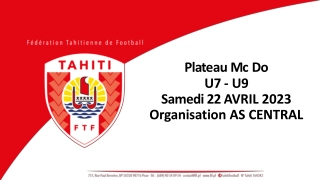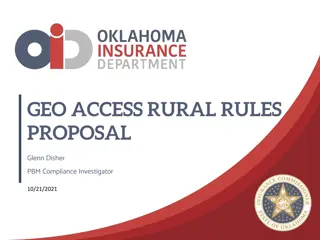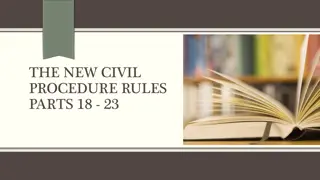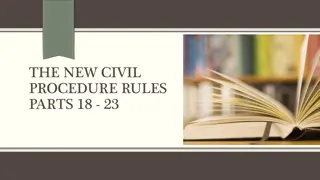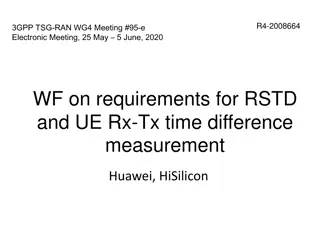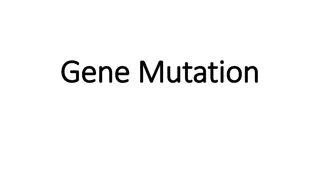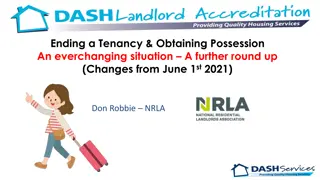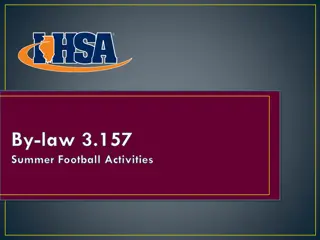Football Rules: Periods, Time Factors, and Substitutions
This content outlines the rules related to periods, time factors, and substitutions in football games. It covers the starting procedures for each period, including warm-up times, coin toss rules, and team selections. Details are provided on the management of periods, intermissions, and potential timing adjustments. Specific guidance is given for the beginning of the 1st and 3rd quarters, as well as the procedures for extra periods and overtime.
Download Presentation

Please find below an Image/Link to download the presentation.
The content on the website is provided AS IS for your information and personal use only. It may not be sold, licensed, or shared on other websites without obtaining consent from the author. Download presentation by click this link. If you encounter any issues during the download, it is possible that the publisher has removed the file from their server.
E N D
Presentation Transcript
Rule 3: Periods, Time Factors and Substitutions ED DUBISH & STEVE ULTRINO MONDAY, SEPTEMBER 11TH, 2017
Start of Each Period First and Third Periods Each team must have at least 22 minutes before opening kickoff to warm up Each half shall start with a kickoff Coin toss to take place 3 minutes before scheduled start time (before second half, the referee will obtain the teams second-half options During Coin Toss, each team shall remain in the area between the 9 yard marks and its sideline or in the team area (PENALTY 5 yards from succeeding spot) Winner of Coin Toss shall choose one of the following options: To designate which team shall kick off To designate which goal line his team shall defend To defer his selection to the second half
Start of Each Period Second and Fourth Periods Between the 1stand 2ndperiods and also between the 3rdand 4th periods, the teams shall defend opposite goal lines The ball shall be relocated at a spot corresponding exactly, in relation to goal lines and sidelines, to its location at the end of the preceding period Possession of the ball, the number of the down and the distance to be gained shall remain unchanged What should each official do at the end of the 1stand 3rdquarter before you begin the quarter (field mechanics)?
Extra Periods Overtime Rule SEE YOUR LEAGUE COMMISIONER AS EACH LEAGUE MAY HAVE DIFFERENT GUIDELINES. MAKE SURE THE REFEREE DISCUSSES THIS BEFORE THE GAME BEGINS.
Playing Time and Intermissions Length of Periods and Intermissions Depending of the league (10, 11 or 12 min quarters) NO PERIOD shall end until the ball is dead and the referee declares the period ended Intermission between halves shall be 20 minutes, unless altered before the game by mutual agreement of the administrations of both schools. Immediately after the second period ends, the referee should begin the intermission by signaling to start the game clock
Timing Adjustments Any time during the game, the playing time and the intermission between halves may be shortened by the referee if he/she is of the opinion that darkness or other conditions may interfere with the game. The four periods MUST be of equal length if the game is shortened before it starts Any time during the game, the playing time of any remaining period or periods may be shortened by mutual agreement of the opposing head coaches and the referee Timing errors on the game clock may be corrected BUT ONLY in the period in which they occur
Timing Adjustments Timing errors on a play clock may be corrected by the referee. The play clock shall start again (Rule 2-29-2) When the play clock count is interrupted by circumstances beyond the control of either team (without positive knowledge of game clock elapsed time), a new count shall be started and the game clock shall start per Rule 3-2-4-b
Extension of Periods A period shall be extended for an untimed down if one or more of the following occurs during a down in which time expires: A penalty is accepted for a live-ball foul (Exception: Rule 10-2-5-a) The period is NOT extended if the foul is by the team in possession and the statement of the penalty includes loss of down There are offsetting fouls An official sounds his/her whistle inadvertently or otherwise incorrectly signals the ball dead Additional untimed downs will be played until a down is free of the above If a touchdown is scored during a down in which time expires, the period is extended for the try (Unless end of 4thquarter and points will not make a difference)
Timeouts: Starting and Stopping the Clock An official shall signal timeout when the rules provide for stopping the clock. ALL OFFICALS SHOULD REPEAT TIMEOUT SIGNALS Officials should keep their sidelines update on timeout situations and be careful not awarding a timeout if the team has exhausted them
Starting and Stopping the Clock Free Kick: After the ball is free-kicked, the game clock shall be started on the official s signal when the ball is legally touched in the field of play Scimmage Down: When a period begins with a scrimmage down, the game clock shall be started when the ball is legally snapped. Starts on the Snap (see FR 49): Some examples include, but not limited to, touchback, incomplete forward pass, a legal kick down ends, a team is granted a charged timeout Starts on the Referee s Signal (FR 49&50): Some examples include, but not limited to, Team A fumble out of bounds, Team A awarded a first down, an illegal pass is thrown to conserve time
Suspending the Game The referee may suspend the game temporarily when conditions warrant such action. When the game is stopped by actions of a person(s) not subject to the rules or for any other reasons not in the rules and cannot continue, the referee shall: Suspend play and direct players to their team area and resume game when referee determines conditions are satisfactory If game is suspended before the end of the 4thperiod and cannot be resumed, there are four possible options: RESUME GAME AT LATER DATE; END GAME WITH A DETERMINED FINAL SCORE; FORFEIT OF THE GAME; DECLARE A NO CONTEST (FR-50) A suspended game, if resumed, will begin with the same time remaining and under the identical conditions of down, distance, field position and player eligibility
Charged Team Timeouts If timeouts are not exhausted, an official shall allow a charged team timeout when requested by an player or head coach when the ball is DEAD 3 Full Timeouts and 2 Twenty Second Timeouts per half (not in ISL) A legal substitute may request a timeout if he is between the nine-yard marks A player who participated during the previous down may request a timeout between the time the ball is declared dead and the snap without being between the nine-yard marks Conference with official: If there is a challenge to a rule enforcement and the enforcement is not changed, the team will be charged a timeout. If all are used then team may receive a delay of game penalty (FR-51 for Coach s Conference)
Injury Timeout An official will declare a timeout and the player(s) must leave the game for at least ONE down. The player(s) MAY NOT RETURN until he receives approval of a professional medical personnel designated by the school If an official sees blood on any player, the player must be removed from play and sent to his sideline Teams cannot take a timeout in order to bring a player back into play. Player must remain out for one play (Except if helmet comes off) Pay close attention to the Concussion Certification video completed each year
Substitutions Any number of legal substitutes for either team may enter the game between periods, after a score or try, or during the interval between downs only for the purpose of replacing a player (s) or filling a player vacancy(ies) Legal Substitutes: No incoming substitute shall enter the field of play or an end zone while the ball is in play No player, in excess of 11, shall leave the field of play or an end zone while the ball is in play (A.R. 3-5-2-I) PENALTY: LIVE BALL FOUL. FIVE YARDS FROM PREVIOUS SPOT
Substitutions An incoming legal substitute must enter the field of play directly from his team area, and a substitute, player or departing player must depart at the sideline nearest his tram and proceed to his team area A departing player must immediately leave the field of play, including the end zones. A departing players who leaves the huddle or his position within three seconds, after a substitute becomes a player, is considered to have left immediately
Substitutions Substitutes who become players must remain in the game for one play and replaced players must remain out of the game for one play, except during the interval between periods, after a score, or when a timeout is charged to a team or to the referee with the exception of a live-ball out of bounds or an incomplete forward pass PENALTY (1stOffense) Dead-ball foul. Delay of game on Team B for not completing its substitutions promptly, or delay of game on Team A for causing the play clock to expire. FIVE yards from the succeeding spot. The referee will then notify the head coach that any further use of this tactic will result in an unsportsmanlike conduct foul PENALTY (2ndOffense)- Dead-ball foul, unsportsmanlike conduct. FIFTEEN yards from succeeding spot.
More Than 11 Players on Field Team A may not break the huddle with more than 11 players nor keep more than 11 players in a huddle for more than THREE SECONDS. Team B is allowed to briefly retain more than 11 players on the field to anticipate the offensive formation, but it may not have more than 11 if the snap is imminent. The official s should flag this before the ball is snapped. PENALTY: Dead-ball foul. FIVE yards at the succeeding spot If officials do not detect the excessive number of players until during the down or after the down is over, or if Team B players have entered the field just before the snap but have not been in formation, the infraction is treated as a live-ball foul. PENALTY: Live- ball foul. FIVE yards at the previous spot.
